Tired of hearing you can't have dental implants due to low bone density? Zygomatic implants offer an amazing solution that could change everything.
Here’s why zygomatic implants stand out:
.svg)
.svg)
.svg)
.svg)
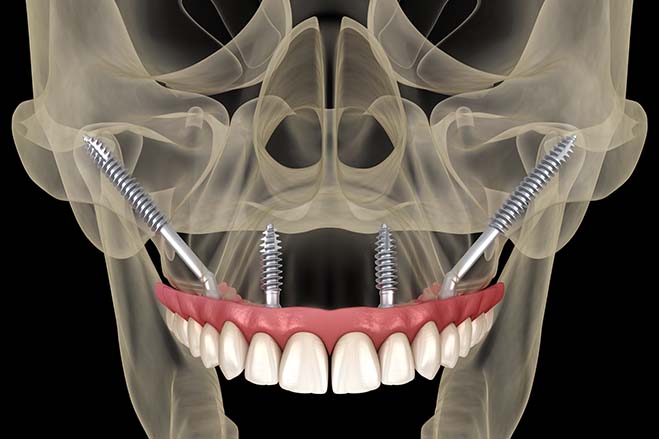
Zygomatic implants offer a unique solution for individuals with severe upper jaw bone loss and missing teeth. These implants are anchored into the cheekbone (zygomatic bone), providing a stable foundation for replacement teeth. They are particularly beneficial for those who are not suitable for traditional dental implants due to insufficient jawbone.
Unlike conventional implants, zygomatic implants eliminate the need for bone grafting, significantly reducing healing time and surgical complexity. Studies have demonstrated a high success rate of over 96%, making them a reliable option for many patients.
Zygomatic implants can support bridges or dentures, providing a natural-looking and functional smile.
At Nuffield Dental, we specialise in providing personalised oral care solutions. Our team of experienced professionals offers a comprehensive approach to zygomatic implant treatment.
Ready to reclaim your smile? Contact Nuffield Dental today for a consultation.
Tired of hearing you can't have dental implants due to low bone density? Zygomatic implants offer an amazing solution that could change everything.
Here’s why zygomatic implants stand out:
Don’t let low bone density stop you. Schedule a consultation today to see if zygomatic implants are the right choice for a beautiful, long-lasting smile.
Contact Nuffield Dental now to book your consultation and find out how zygomatic implants can make a big difference in your life.
Zygomatic implants are a solution for replacing upper teeth when you have low bone in your jaw. These longer implants are anchored into your cheekbone (zygoma) not your jawbone.
Before the procedure your dentist will take detailed scans of your mouth and face. This will help plan the exact placement of the implants.
During the procedure the implants are placed through your upper jaw and into your cheekbone. This provides a solid base for the artificial teeth.
One of the benefits of zygomatic implants is they often allow for immediate loading. This means you may be able to get temporary teeth the same day as surgery.
Over time the implants will fuse with your bone through a process called osseointegration (bone ingrowth into a metal implant). This will give you long term stability for your new teeth.
Zygomatic implants can be used alone or in conjunction with regular implants. They’re ideal if you have severe bone loss in your upper jaw.
The zygomatic anatomy-guided approach is a technique that places the implant on the outer surface of the maxillary sinus. This minimizes complications and optimizes results.
By using your cheekbone for support zygomatic implants often eliminate the need for bone grafting. This makes the treatment faster and more accessible for many patients.
Zygomatic implants come in different types to suit different levels of bone loss and dental needs. Each type is designed for patients with severe maxillary atrophy (a condition where the upper jawbone (maxilla) shrinks or deteriorates over time).
Here's a breakdown of the different types of zygomatic implants:
Description: A combination of traditional dental implants and zygomatic implants.
Benefits: Less invasive than other zygomatic implant options, suitable for patients with some remaining bone in the upper jaw.
Process: Two zygomatic implants are placed in the back of the mouth, while two to four traditional implants are placed in the front. This provides strong support for a full dental bridge.
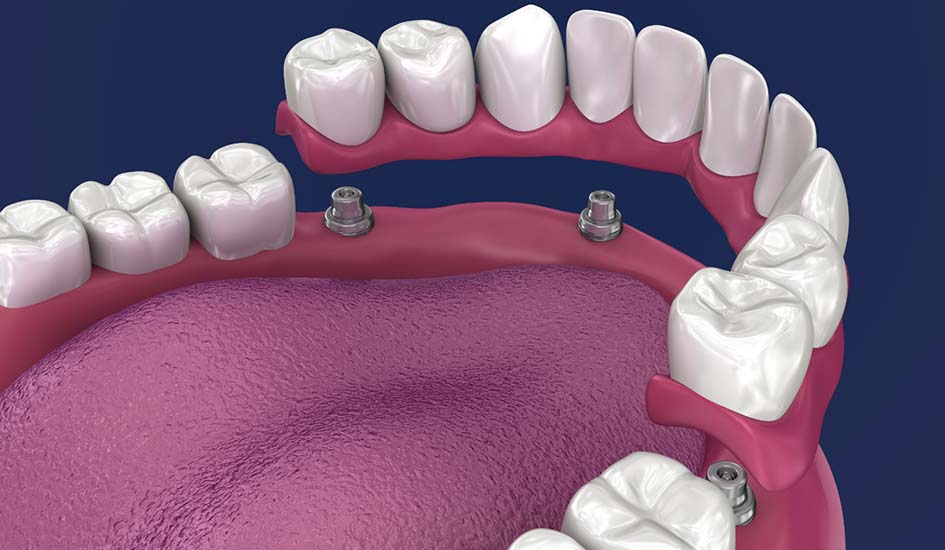
Description: Two zygomatic implants are placed on each side of the upper jaw.
Benefits: Ideal for patients with moderate to severe bone loss, often a faster alternative to bone grafts or sinus lifts.
Process: The implants pass through or next to the sinus cavity and anchor into the cheekbone for stability.
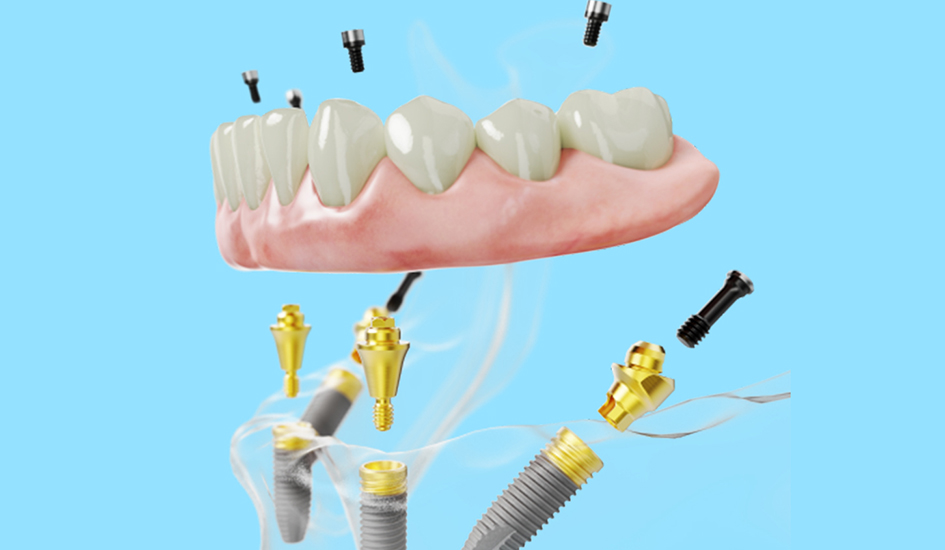
Description: Four zygomatic implants are placed, two on each side of the upper jaw.
Benefits: Suitable for patients with extreme bone loss, can often avoid bone grafts, and provides a strong foundation for a full set of upper teeth.
Process: The implants are inserted into the cheekbones, offering a stable platform for fixed teeth.
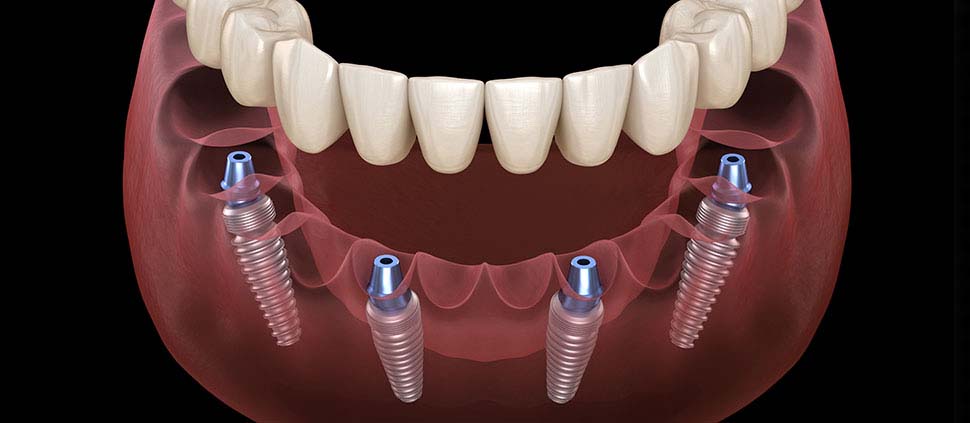
Here are some common reasons why you need to consider zygomatic implants:
One of the key benefits of zygomatic implants is that they can often eliminate the need for complex bone grafting procedures. Even if you have significant bone loss in your upper jaw, the zygomatic implants can be anchored to the cheekbone (zygoma), which typically has enough healthy bone mass to support the implants securely. This means that you can often undergo a painless and minimally invasive procedure.
Book a consultation with Nuffield Dental to see if you’re a candidate for zygomatic implants. We’ll assess your case and advise you on the options.
Nuffield Dental offers zygomatic implant surgery. Here's what you need to know.


Note: The specific timeline and procedures may vary depending on individual circumstances. Please consult with our dental team for personalised information.

Zygomatic implants can be a life changing solution for severe bone loss but they come with some short term risks you should be aware of. Your surgeon will discuss these with you before the procedure.
Zygomatic implants offer numerous advantages for individuals with significant bone loss. However, like any surgical procedure, they are not without potential risks.
One common concern is the risk of infection. Adhering to the dentist's post-operative care instructions and practising diligent oral hygiene can significantly reduce this risk. Additionally, the proximity of zygomatic implants to the sinus cavities may lead to sinusitis.
While rare, nerve damage can occur during the implant placement process. A skilled surgeon can minimise this risk. Patients may also experience temporary swelling, bruising, or discomfort. If these symptoms persist, it's crucial to inform the dental team.
In some cases, implant failure may occur due to improper placement or inadequate bone integration. Regular follow-up appointments are essential to monitor healing and address any complications promptly.
If you're considering zygomatic implants, it's essential to choose a qualified dental professional with experience in this procedure. A reputable clinic, like Nuffield Dental, can provide you with the expertise and care you need for a successful outcome.
Don't let dental issues hold you back. Trust Nuffield Dental for expert care and a beautiful smile. Contact us to schedule your appointment.
The cost of dental implants in Singapore can vary significantly based on several factors. These include:
To get a quote, book a consultation with Nuffield Dental. They will assess your case and give you a detailed treatment plan with costs.
Zygomatic implants are not covered by standard dental subsidies in Singapore. The Ministry of Health’s Implant Subsidy List (ISL) focuses on more common medical implants like those for the heart, eyes and knees.
Dental implants may have some subsidies but zygomatic implants are a specialised treatment not included in general subsidy schemes. They are usually a private procedure.
If you are considering zygomatic implants, ask your dentist or oral surgeon about financial assistance options. Some clinics may have payment plans or discounts for complex cases. You may also be able to use Medisave to cover part of the cost but check with your dentist about this option.
Here are a few ways to reduce costs:
Remember zygomatic implants is a complex procedure. While cost is important, prioritise finding an experienced surgeon for the best results. Contact Nuffield Dental today to schedule a consultation with our expert team and discuss your options.
Nuffield Dental stands out as the premier choice for zygomatic dental implants in Singapore. Led by the renowned Dr. Samintharaj Kumar, our team boasts unparalleled expertise in this specialised field.


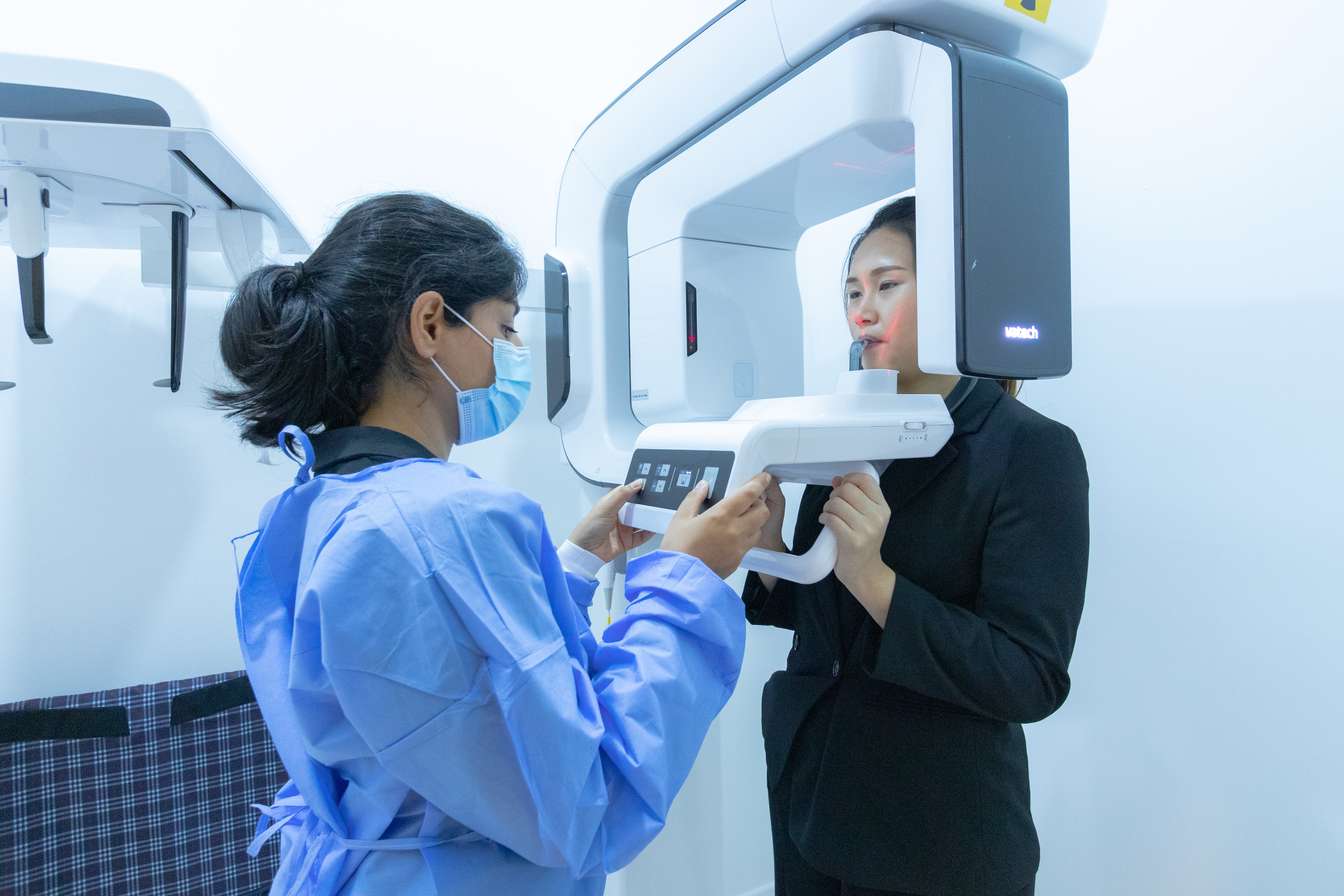
Book a consultation today and discover why Nuffield Dental is the ideal choice for your zygomatic implant journey.

Zygomatic implants and conventional dental implants represent two distinct approaches to dental restoration, each with its own merits and considerations.
The fundamental difference lies in their placement: conventional implants are anchored into the jawbone, while zygomatic implants are secured to the zygoma bone, located beneath the cheek. This distinction has significant implications for stability, suitability, and the surgical procedure involved.
Zygomatic implants, by their attachment to the zygoma bone, offer exceptional stability. The zygoma is a robust facial bone, providing a secure foundation for dental restorations. This makes zygomatic implants particularly suitable for patients with insufficient jawbone density, a common challenge in cases of extensive tooth loss or bone resorption.
Moreover, zygomatic implants allow for immediate loading, meaning that replacement teeth can be attached to the implants as soon as they are placed, eliminating the need for a healing period.
| Feature | Zygomatic Implants | Conventional Dental Implants |
|---|---|---|
| Placement | Zygoma bone |
Jawbone (alveolar bone) |
| Stability | Very high |
High, but may be limited by bone density |
| Suitability | Ideal for patients with insufficient jawbone density |
Suitable for most patients with adequate bone density |
| Surgical Procedure | More complex, often requiring a specialized surgeon |
Less complex, typically performed by general dentists or oral surgeons |
| Healing Time | Shorter (immediate loading possible) |
Longer (typically 3-6 months for osseointegration) |
| Cost | Generally higher |
Generally lower |
Zygomatic and pterygoid implants are specialised dental implant solutions designed for patients with severe upper jaw bone loss. While both offer a viable alternative to traditional dental implants, they differ significantly in their placement and potential benefits.
Zygomatic implants are anchored to the cheekbone, providing a strong foundation for supporting dental prosthetics. This placement can offer the added benefit of lifting the cheekbones, potentially improving facial aesthetics. On the other hand, pterygoid implants are inserted near the base of the skull, at the back of the mouth. They are particularly effective for strengthening the jawline and providing a secure anchor for dental restorations.
Key Differences:
| Feature | Zygomatic Implants | Pterygoid Implants |
|---|---|---|
| Placement | Cheekbone |
Base of the skull |
| Benefits | Cheekbone lifting, facial aesthetics |
Jawline strengthening |
| Success Rate | High (over 96%) |
High (over 96%) |
| Suitable For | Severe upper jaw bone loss |
Severe upper jaw bone loss |
When faced with insufficient bone in the upper jaw, zygomatic and subperiosteal implants are two potential options. Both offer solutions for patients seeking dental implants, but they differ significantly in their placement and long-term stability.
Zygomatic implants are anchored to the cheekbone, providing a robust foundation even in cases of severe bone loss. They are longer than traditional implants, allowing them to reach the denser bone of the cheekbone. While this placement offers superior stability, the surgical procedure is more invasive.
Subperiosteal implants rest on top of the jawbone but beneath the gum tissue. This option requires less bone density than regular implants, making it a suitable choice for patients with moderate bone loss. However, the framework nature of subperiosteal implants may result in less long-term stability compared to zygomatic implants.
| Feature | Zygomatic Implants | Subperiosteal Implants |
|---|---|---|
| Placement | Anchored to the cheekbone |
Rest on top of the jawbone beneath the gum tissue |
| Bone Density Required | High |
Moderate |
| Stability | Generally higher |
Potentially lower |
| Surgical Complexity | More invasive |
Less invasive |
| Cost | Typically higher |
Typically lower |
Zygomatic and All-on-4 dental implants are two popular options for replacing missing teeth. The primary difference lies in their placement. Zygomatic implants are anchored to the cheekbone, while All-on-4 implants are secured to the jawbone.
Zygomatic implants are ideal for patients with insufficient jawbone in the upper jaw. This can occur due to bone loss from tooth extraction, periodontal disease, or other factors. By anchoring to the cheekbone, these implants offer a stable foundation for a full set of teeth, even in cases where traditional implants may not be feasible. However, the surgical procedure for zygomatic implants is more complex and may involve a longer recovery period.
All-on-4 implants are a suitable option for patients with adequate jawbone. This method involves strategically placing four implants at angles to maximise bone contact and support a full denture. All-on-4 implants offer a less invasive procedure and shorter recovery time compared to zygomatic implants.
Here's a quick comparison table to summarise the key differences:
| Feature | Zygomatic Implants | All-on-4 Implants |
|---|---|---|
| Placement | Cheekbone |
Jawbone |
| Bone Requirement | Insufficient |
Adequate |
| Procedure Complexity | Higher |
Lower |
| Recovery Time | Longer |
Shorter |
| Cost | Generally higher |
Generally lower |
Zygomatic implants have evolved since their introduction in the late 1980s. Prof. Per-Ingvar Brånemark, the father of dental implantology, first developed these devices. They were designed for patients with severe maxillary bone loss.
Initially zygomatic implants were used for patients with maxillary defects from trauma, cancer or birth conditions. As time went by their use expanded to patients with upper jaw atrophy.
Better technology and surgical techniques have made zygomatic implants more successful. They have higher success rates and shorter recovery time. Good news for you if you were told you can’t have regular dental implants.
Now they are a popular choice for full mouth restoration. They offer hope to many who couldn’t have dental implants before. If you have severe upper jaw bone loss you should ask your dentist about this option.
Zygomatic implants have come a long way. They’re more versatile and can help more people. As technology keeps improving who knows what the future will bring for these amazing implants?
Zygomatic implants are placed under general anesthesia, so patients feel no pain during the procedure. There is minimal post-surgery pain, and over-the-counter medications are often sufficient for recovery.
Zygomatic dental implants can be a worthwhile investment, especially for patients with severe bone loss. They offer a durable, permanent solution that improves both function and appearance. While the initial cost may be higher, the long-term benefits and potential cost savings can outweigh the investment.
While zygomatic implants might cause discomfort, the pain is usually manageable with anesthetic and post-procedure care. Many patients find the long-term benefits of improved dental function and aesthetics well worth the temporary discomfort.
Yes, zygomatic implants are more costly than regular dental implants. This is because of the complexity of the procedure and the limited number of surgeons who can do it. You’ll need to weigh the cost against the benefits, like comfort and success rate.
Zygomatic implants are a long-term solution for tooth and jawbone loss. With proper care, they can last more than 12 years and even a lifetime. Good oral hygiene, regular dental check-ups, and a healthy lifestyle are key to keeping your implants strong.
Medical References
Aparicio, Carlos, et al. “Zygomatic Implants: Indications, Techniques and Outcomes, and the Zygomatic Success Code.” Periodontology 2000, vol. 66, no. 1, Aug. 2014, pp. 41–58, doi:10.1111/prd.12038.
Fill out the form for any request or questions you have and we will contact you within one working day..
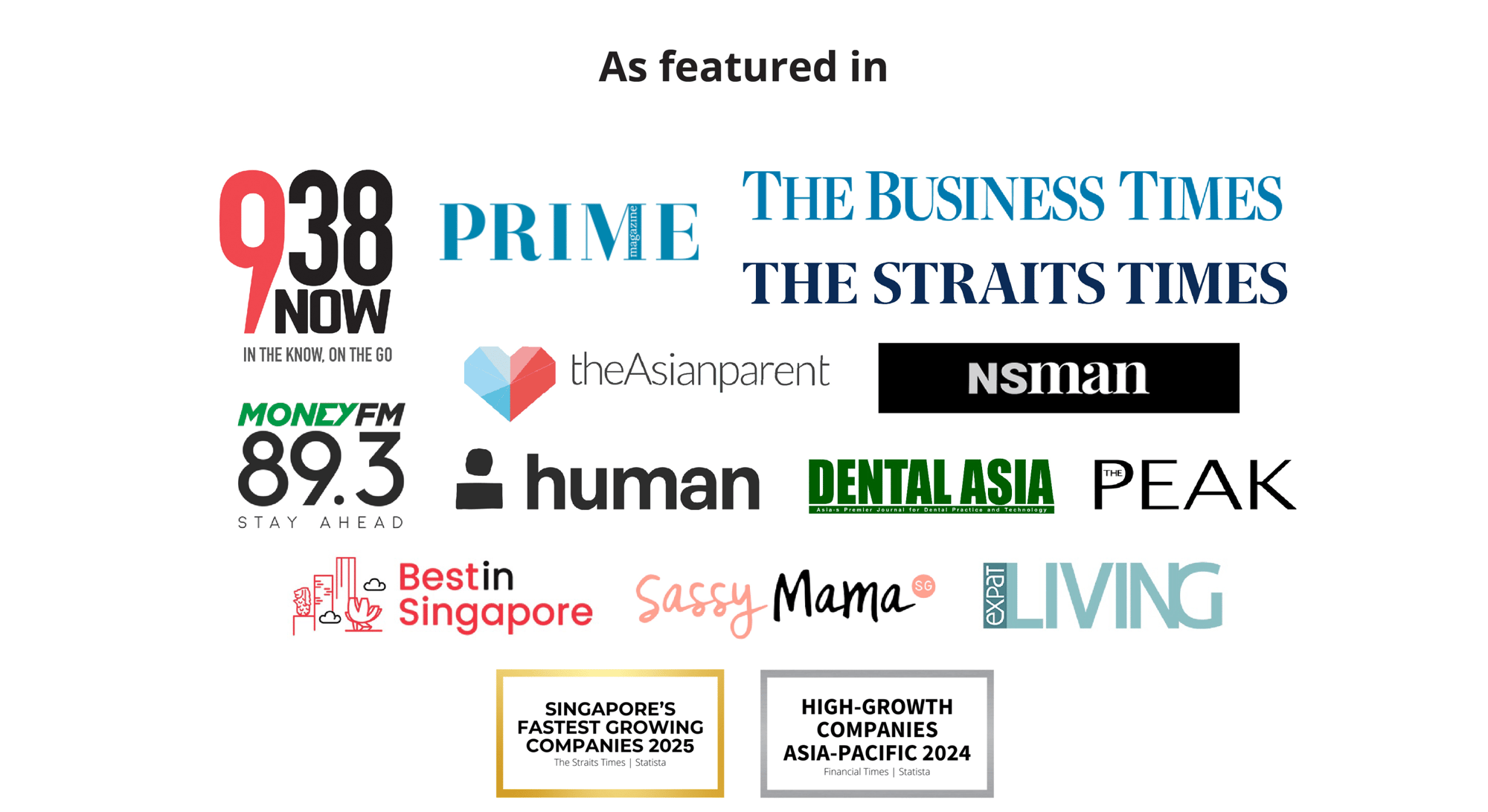

Nuffield Dental is a one-stop, multi-disciplinary dental care centre. At Nuffield, we put you first. We believe in providing personalised service for each patient.
Nuffield Dental is a one-stop, multi-disciplinary dental care centre. Here at Nuffield Dental, we pride ourselves of our personalised oral care for each and every one of our patients. We need to make sure you get all the help you need to make your dental procedures comfortable, accessible and seamless.

Our dentists have a special interest inoral maxillofacial surgery and are accredited dental providers who have been helping patients achieve confident smiles.
The newest and best lifestyle articles selected by our editorial team.

Traditional braces have done wonders for millions of people around the world, but the new generation of clear aligners are here to step up the game....

What are Veneers? Veneers are thin, tooth-coloured layers that are applied to the surface of teeth to improve their appearance. It is a painless...
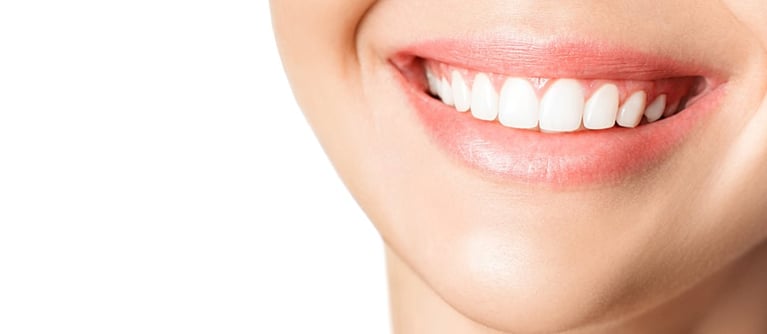
What is cosmetic dentistry? Not blessed with straight, pearly white teeth? Cosmetic dentistry can give you that healthy, confident smile! This dental...